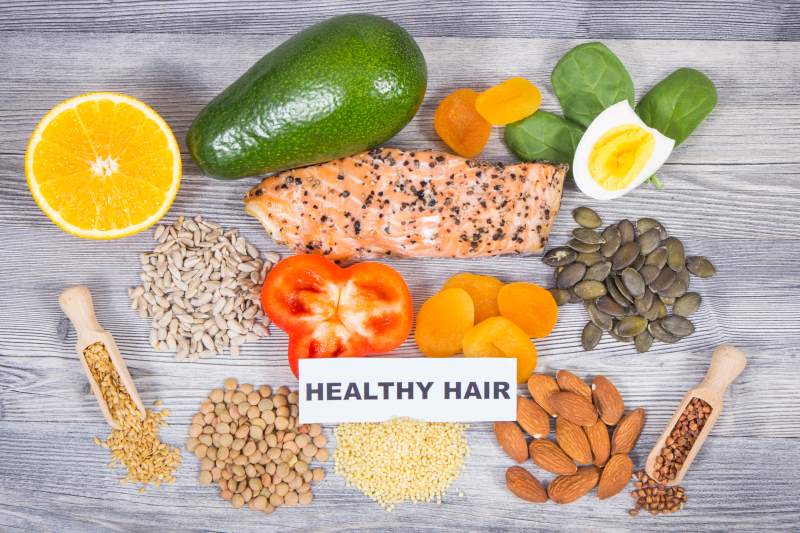What Vitamins & Supplements are Good for Hair Growth?

Do you know vitamins can work as an elixir for healthy hair? You can include food items rich in vitamins A, B, C, D, and E-rich fruits to their diet, which will gradually boost the growth of your hair. Each vitamin plays a unique role in hair health, from promoting scalp circulation to strengthening hair follicles.
Consistent intake of these vitamins can lead to visibly healthier, shinier hair over time. Are you interested to know more about vitamins for hair growth? Keep scrolling to find a detailed explanation on this topic.

Table of Contents

Do Vitamins for Hair Growth Really Work?
Hair growth is dependent on certain factors like hormones, genetics, diet and lifestyle choices. In addition, factors like stress and pollution can damage one’s hair follicles, which then leads to hair fall.
Moreover, hair grows through a multi-phase process called the hair growth cycle. In this cycle, the hair follicles create new hairs that grow to their full length over the years. These follicles require a balanced proportion of vitamins, minerals, and other essential nutrients to grow effectively.
Therefore, one can include vitamins in his/her diet to boost hair growth. These vitamins contribute to a healthy immune system, which positively impacts the shine and thickness of hair.
That said, it is essential to know which vitamin is necessary for hair growth so that one can prepare a meal plan accordingly.
Best Vitamins & Supplements for Hair Growth
A well-balanced diet is critical for luscious tresses. However, vitamins offer extra help to enhance hair growth and restoration.
Below is a detailed explanation of the vitamins that help hair growth. Moreover, this section also elaborates on which vitamin is good for hair growth.
Best Sources of Essential Vitamins & Supplements for Hair Growth

Understanding the best sources of essential vitamins and supplements can significantly enhance hair growth and health. Incorporating the following nutrient-rich foods and supplements into your diet for optimal hair care.
Daily Intake of Vitamins & Supplements for Healthy Hair
Ensuring you get the right amount of vitamins and supplements daily is crucial for maintaining healthy hair. Below is a guide to the recommended daily intake limits for various age groups.
Useful Tools to Track Your Health
How Fast Do Vitamins Help in Hair Growth?
Your hair generally grows by half an inch in a month. But, hair growth differs with body type and environmental conditions.
In addition, when using vitamins to supplement hair growth, results of regeneration can be visible after approximately two months. Individuals should also know that hair growth is a slow process; it may take 5 to 6 years for a new strand of hair to reach the length of one’s shoulders.
Therefore, individuals should have patience and switch to a healthier lifestyle. Drinking water, exercising, maintaining a diet, and following an 8-hour sleep cycle will improve hair health.
With the subject of which vitamin is essential for hair growth now out of our way, let us delve into the probable side effects of taking vitamins.
Role of Vitamins & Supplements for Healthy Hair
Vitamins and supplements play a critical role in maintaining healthy hair. Each nutrient contributes uniquely to hair growth, strength, and overall health. Below is a detailed look at the benefits of various vitamins and supplements for your hair.
How to Support Hair Growth?
Supporting hair growth involves a combination of proper nutrition, hair care practices, and lifestyle choices. Here are some essential tips to help you achieve and maintain healthy hair.
- Maintain a Balanced Diet: Ensure your diet includes a variety of vitamins and minerals essential for hair growth, such as vitamins A, B, C, D, E, biotin, zinc, and iron. Foods like leafy greens, nuts, seeds, fish, and lean meats are excellent sources.
- Stay Hydrated: Drinking enough water is crucial for overall health, including hair health. Proper hydration ensures that hair follicles receive essential nutrients and helps maintain scalp moisture, preventing dryness and breakage.
- Use Gentle Hair Care Products: Choose shampoos and conditioners that are free from harsh chemicals and sulphates. Opt for products with natural ingredients to nourish your hair and scalp without causing damage or irritation.
- Regular Scalp Massage: Massaging your scalp can improve blood circulation, promoting nutrient delivery to hair follicles. This can enhance hair growth and improve overall scalp health. Consider using essential oils for added benefits.
- Manage Stress: High-stress levels can negatively impact hair growth and lead to hair loss. Practice stress-relieving techniques such as yoga, meditation, or deep-breathing exercises to maintain a healthy mind and body.
How to Boost Vitamin Levels for Healthy Hair?

Boosting your vitamin levels can significantly improve the health and growth of your hair. Here are some simple tips to enhance your vitamin intake.
- Eat a Balanced Diet: Include a variety of fruits, vegetables, lean proteins, and whole grains to ensure you get all essential vitamins and minerals.
- Take Supplements: Consider taking multivitamins or specific supplements like biotin, vitamin D, and omega-3 if you’re not getting enough from your diet.
- Consume Vitamin-Rich Foods: Focus on foods high in vitamins A, B, C, D, and E, such as leafy greens, nuts, seeds, citrus fruits, and fatty fish.
- Stay Hydrated: Drink plenty of water to help your body absorb nutrients more efficiently and maintain overall health.
- Avoid Processed Foods: Limit intake of processed foods that can hinder nutrient absorption and negatively impact hair health.
Vitamin Deficiency Diseases Linked to Hair Loss
- Lack of vitamin D can lead to hair thinning and hair loss. It plays a crucial role in the hair growth cycle, and deficiency can disrupt the process.
- Essential for keratin production, biotin deficiency can cause hair thinning and hair loss. Biotin is vital for healthy hair growth and texture.
- Important for red blood cell production, a deficiency in B12 can reduce oxygen supply to hair follicles, leading to hair loss.
- Necessary for collagen production, vitamin C deficiency can weaken hair structure and cause hair loss. It also aids in iron absorption, which is critical for hair health.
- Iron deficiency, often associated with inadequate vitamin C levels, can lead to hair thinning and loss. Iron is vital for carrying oxygen to hair follicles.
- Vitamin A is required for cell growth, including hair cells. However, deficiency and excess can lead to hair loss, highlighting the need for balanced intake.
- Zinc is crucial for hair tissue growth and repair. Deficiency can lead to hair loss, and vitamin A helps regulate zinc levels.
- Essential for blood circulation to the scalp, niacin deficiency can result in hair loss and unhealthy scalp conditions.
Effects of Long-term Vitamin Deficiency on Hair
Long-term vitamin deficiency can significantly impact hair health, often resulting in issues such as thinning, brittleness, and increased hair loss. Vitamins play a crucial role in maintaining the strength, texture, and growth of hair. Without an adequate supply of essential vitamins, hair follicles can become weakened, leading to poor hair quality and slower growth.
Over time, the lack of vital nutrients can make hair more susceptible to damage, leaving it looking dull and lifeless. Ensuring a balanced diet rich in essential vitamins is key to maintaining healthy, vibrant hair and preventing long-term damage.
Are There Any Side Effects of Taking Vitamins for Hair Growth?
Although vitamins are essential for hair growth, one must not consume them excessively. Moreover, individuals should always consult a doctor or dietician before making changes to their diet. Avoiding this factor may lead to several issues like-
- Consuming too much vitamin A can lead to severe hair loss.
- Excess Biotin supplementation can alter hormones, resulting in false laboratory results.
- Excessive vitamin D, vitamin B12, and vitamin B9 can cause grey hair during childhood or early adulthood.
Hair loss is a common problem among individuals with genetic or medical conditions. However, the consumption of micronutrients, such as vitamins and minerals, can boost hair follicle development and immune cell function. Hence, it is vital to know which vitamin is responsible for hair growth and its suggested amount of consumption.
Therefore, consume only the recommended dose of vitamins for hair growth to ensure long, and healthy hair.
Disclaimer: Besides studying which vitamin is best for hair growth, individuals should also consult a dietician regarding their meal plan. Moreover, this content is written by referring to several medical articles and blogs. Individuals are, therefore, advised to consult a medical practitioner for professional treatment of hair fall.
Should You Take a Hair Growth Supplement?
Deciding whether to take a hair growth supplement depends on your individual needs and hair health goals. Hair growth supplements can provide essential nutrients that might be missing from your diet, potentially enhancing hair strength, thickness, and overall health.
However, it's important to understand that these supplements are not magic pills. They work best when combined with a balanced diet, proper hair care, and a healthy lifestyle. Before starting any supplement regimen, it's advisable to consult with a healthcare professional to ensure it's appropriate for your specific situation and to avoid any possible adverse effects.
In conclusion, maintaining optimal hair health hinges significantly on a balanced intake of essential vitamins. While a nutritious diet should ideally provide these necessary vitamins, supplements can serve as a valuable addition for those struggling to meet their nutritional needs.
However, it's crucial to approach supplementation with caution and professional guidance. Prioritising a holistic approach to hair care, encompassing diet, lifestyle, and proper hair maintenance, will yield the best results in achieving and sustaining healthy, vibrant hair.
Protect What Matters - Explore Other Insurance Options














